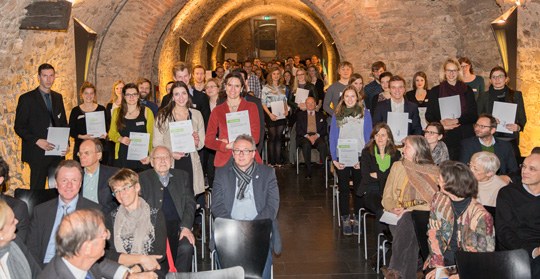Greater freedom to learn and live
Freiburg, Mar 06, 2017
For the last five years there has been a new grant culture. The Deutschlandstipendium supports outstanding students and pays tribute to their civic involvement. The scholarship provides 300 euros per month to help students, and it strengthens the ties between the university, business, and society.
Alexandre Kunz spends every free moment in the University Library. There are four weeks to go until his first state examination in Law. Punctually at eight every morning he enters the building on the Platz der Alten Synagoge. His stress level is high, he says - he’s not one of those high flyers who get through effortlessly. “I’m glad that right now I can fully concentrate on studying. When I first started my degree, I also had to work 20 hours a week.” For the last six semesters he has had greater freedom to learn and live – The Deutschlandstipendium provides him with 300 euros each month.
Time for civic involvement
Germany’s Ministry of Education and Research (BMBF) launched the scholarship in 2011. It has been awarded at the University of Freiburg since winter semester 2012-13. “As a tool for supporting outstanding students, the Deutschlandstipendium laid the foundation stone for a new scholarship culture,” explains Daniela Mast, coordinator of the program at the University of Freiburg. “It promotes committed students, gives them an incentive to get top grades, and strengthens the ties between the University, business, and society. It also reduces the burden, so that students can concentrate fully on their studies, and their abilities can develop to the full.” Around 90 percent of German universities have joined the program and some 24,000 students across the country are receiving the scholarship. That makes the Deutschlandstipendium the biggest public-private project in education which Germany has ever seen.
 Full house at the Peterhofkeller: Deutschlandstipendium recipients meet with their sponsors at the University once a year. Photo: Uwe Nüssle
Full house at the Peterhofkeller: Deutschlandstipendium recipients meet with their sponsors at the University once a year. Photo: Uwe Nüssle
Each institution of higher education chooses its own scholarship recipients. Freiburg has introduced a points system which focuses primarily on good academic performance; but civic involvement, coming from a non-academic background, or having to overcome biographical hurdles are also taken into account. Rita Bauer, a dentistry student in her fifth semester, sees her Deutschlandstipendium as recognition of her hard work. Not just the work which can be measured by her grades. She gave flute lessons, took part in music competitions, formed a working group at her school, and was an altar girl. Before he started studying, Alexandre Kunz spent half a year working for a private elderly-care nurse in France; now he accompanies refugees seeking jobs and going to government offices. He now has more time for such civic involvement now that he has the scholarship.

Photo: ajcabeza/Fotolia
Public-private partnership is the idea behind this kind of support. The federal government and private sponsors work together - A business, private citizen, or foundation donates 150 euros per month to each Deutschlandstipendium scholarship, and the Ministry of Education matches it with another 150. So a scholarship costs 1800 euros annually for the sponsor. Georg Greitemann, a partner in the legal firm P+P Pöllath + Partners, which sponsors three students, sees this leverage effect as a big incentive for donors. “But I sponsor scholarships above all because I want the students to make something of themselves and of their time.” When he got the call asking if he would participate in the Deutschlandstipendium, he also thought about the advantage for his firm. The scheme brings him into contact with gifted young people he may want to recruit. Another sponsor, Ursula Schaefer, is an almuna and adjunct professor at the University of Freiburg; she was impressed by the strong feeling of solidarity among the scholarship holders. “There is a strong sense of togetherness among the scholarship holders of a given year. Creating that kind of solidarity among the mass of students and forming a close bond with the University - I think that is very valuable.”
No less than 107 students from all manner of disciplines and at all the different study phases are receiving support in the current 2016-17 scholarship period - more than ever before. There are currently 28 regional and supraregional sponsors. “But we could achieve more for our talented students,” Daniela Mast says. The Education Ministry has allocated a total of365 scholarships. Mast would like to see a bigger contribution from the business sector. “At the moment the majority of sponsors are alumni who want to give back something to their alma mater via the Deutschlandstipendium.” Rita Bauer also wants to give something back. “I’ve already decided that I will sponsor Deutschlandstipendium scholarships later myself. I’ve seen how much it means to get this support during your studies.”
Sonja Seidel
Applying for the Deutschlandstipendium
Further information on the Deutschlandstipendium
Would you like to sponsor a scholarship? Please contact Daniela Mast (Phone: +49 (0) 761 203-67729), Deutschlandstipendium coordinator at the University of Freiburg.

